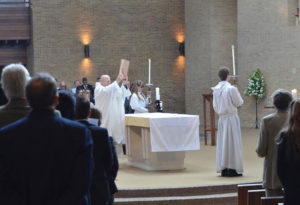The Call to Mission in England and Wales
Evangelii Gaudium Sunday, the day we celebrate the domestic mission work of the Catholic Church, falls on 21 September 2025. It’s theme is ‘I believe…’ inspired by the 1,700th anniversary of the Council of Nicaea – the great gathering of Bishops from around the world that formulated the Creed we proclaim every Sunday at Mass.
In 2013, the first year of his pontificate, the late Pope Francis released an Apostolic Exhortation on the joy of the Gospel titled Evangelii Gaudium. In it, he encouraged the Christian faithful to “embark on a new chapter of evangelisation” marked by this joy, whilst striving to find new paths to proclaim the Gospel in today’s world.
We cannot forget that evangelisation is first and foremost about preaching the Gospel to those who do not know Jesus Christ or who have always rejected him. Many of these are quietly seeking God, led by a yearning to see his face… Christians have the duty to proclaim the Gospel without excluding anyone.
Pope Leo XIV has consistently emphasized the Church’s missionary dimension and the importance of evangelization in his early pontificate. He sees mission as the fundamental aspect of the Church’s identity and a priority for his Petrine ministry.
Continuing the Path of Evangelization
Pope Leo XIV has expressed his commitment to continuing the path set forth by his predecessors, particularly Pope Francis, in the Apostolic Exhortation Evangelii Gaudium. He highlights several fundamental points from this document that guide the Church’s missionary efforts.
He emphasizes that the Church’s evangelization mission requires authentic discipleship through a personal encounter with Christ, fostering fraternity, and proclaiming peace and God’s love in a world wounded by conflict and injustice. This mission extends beyond physical spaces to digital platforms, urging online influencers to embody “the suffering flesh of Christ” and maintain a human touch in technology. The core of his message is that the Church must be a missionary body that is a “leaven of harmony,” actively reaching out to and incorporating families and individuals, especially those spiritually distant or excluded.
